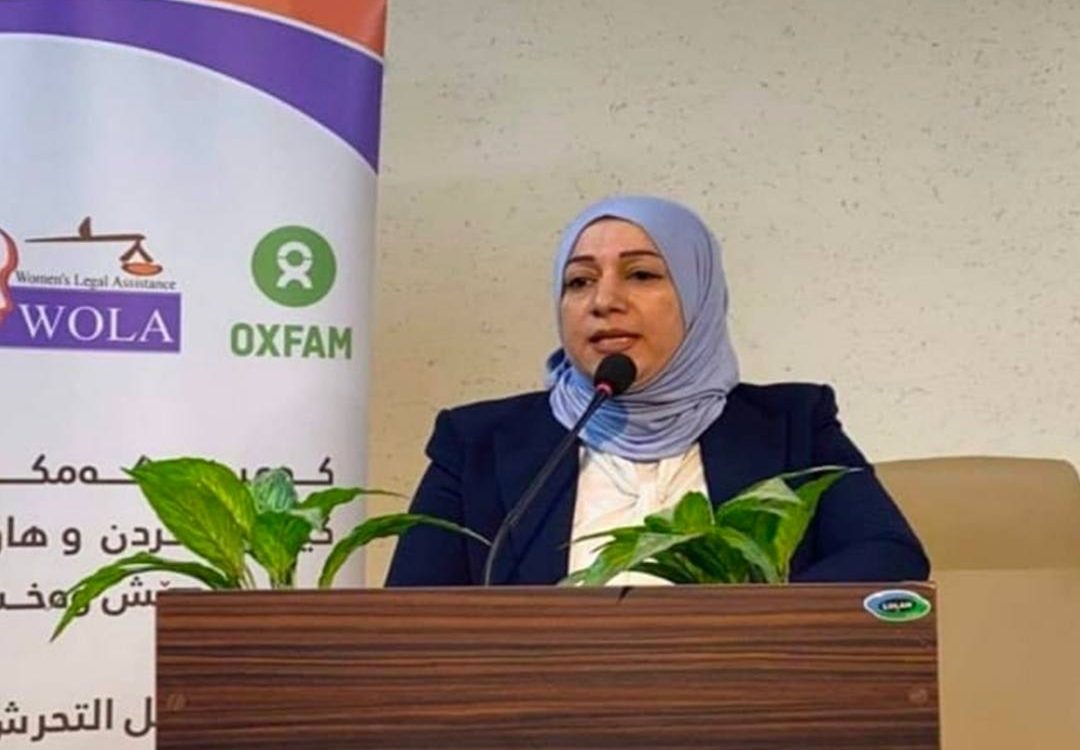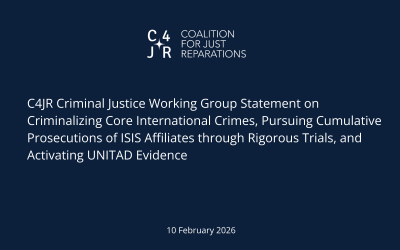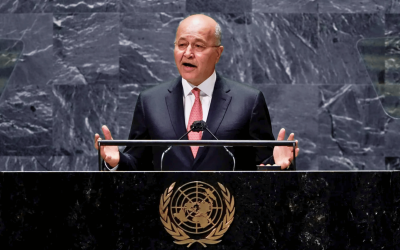Thank you so much for providing me an opportunity to speak on behalf of the Coalition for Just Reparations (C4JR) at the UNITAD Plenary Roundtable about the Yazidi Survivors Law. This is not to be taken for granted and I thank you on behalf of the many members of Iraqi civil society who actively Engaged in strengthening this law and pushing for its passage.
C4JR is an Iraqi NGO alliance calling for comprehensive reparations for survivors of atrocities perpetrated During the Islamic State of Iraq and the Levant (ISIL) conflict in Iraq. C4JR seeks to provide a collaborative And safe space where the grievances of survivors belonging to all affected groups (Yazidi, Turkmen, Shabak, Kakai, Christians, Shia, Sunnis, and others) can be adequately addressed. C4JR does not wish to Speak instead of survivors but to equip and support survivors, amplify their voices, and be heard alongside them. To make sure the topic of reparations is on the agenda and remains there, to provide space for deliberation, collaboration, and reflection, not only with survivors but also with state authorities And international partners. To make available access to good practices, to incorporate international Standards, and learn from the mistakes and successes of other post-conflict initiatives.
The passing of the Yazidi Survivors Law (YSL) in March 2021 marked an important milestone in Iraq’s post-conflict process, as it promised to deliver long-awaited relief not only to Yazidi women but also to other Survivors belonging to ethnoreligious communities ISIL targeted. This groundbreaking law is also one of The very few examples of states taking deliberate action to specifically address the rights and needs of survivors of conflict-related sexual violence. This law mandates a number of critical reparations for Survivors from the Yezidi, Christian, Turkmen, and Shabak communities, including financial support; Medical and psychological care to facilitate rehabilitation; the provision of land, housing, and education And a quota in the public sector employment. Additionally, the law explicitly recognizes that ISIL committed Genocide and crimes against humanity against the recognized beneficiary groups, and obligates governmental authorities to investigate and prosecute these crimes (without general or special amnesty), search for those who remain missing, protect witnesses and survivors, and establish August 3rd of each Year as a National Day of Remembrance. The associated bylaws expanded these obligations even further, Including, for instance, an obligation for government agencies to develop specialized curricula on the ISIL conflict designed to promote peaceful coexistence and the renunciation of violence.
We are now entering a critical window in which the groundwork for effective and survivor-centered Implementation of the Yezidi Survivors Law should be laid. For this effort to succeed, we must ensure that:
- Sufficient funding for the proper implementation of the law is included in the 2022 Iraq federal budget.
- Well-structured application forms, transparent and accountable outreach, and application and review procedures are in place. Codes of conduct for ethical engagement with survivors, comprehensive training and relevant safeguards as well as a regular state-run mechanism of consulting survivors are arranged. Finally, a viable system for offering quality medical and MHPSS services on the ground in Nineveh, Sinjar, and elsewhere, is set up within reach of survivors and their families.
Great progress has undoubtedly been made through the passage of the Yezidi Survivors’ Law, but without Sustained dedication, this law will remain on paper and its promised benefits will not reach survivors in Need, many of whom still linger in IDP camps or live under the poverty line, traumatized, without access To services, and without recognition. Iraqi authorities must, therefore, remain committed to honoring and Supporting ISIL survivors in practice and continue setting an example for the world. Consistent Engagement of survivors themselves, civil society, international organizations and others is also necessary So that opportunities made possible through YSL don’t remain unrealized. Let us not forget that delayed And ineffective implementation of the Yazidi Law prolongs the agony and trauma of survivors, their families, and affected communities.
We at the C4JR believe that criminal accountability and reparations go hand in hand. They are not to be separated, as survivors can only heal if they experience holistic justice. Fortunately, the YSL provides a solid framework for both.
We would like to see UNITAD support the implementation of the YSL, and especially its accountability component, by, for instance, providing forums for revealing the crimes of ISIL in Iraq, part and parcel of The YSL, supporting efforts to incorporate genocide, crimes against humanity and war crimes into Iraqi National law and establish a survivor-friendly criminal accountability mechanism for ISIL crimes in Iraq, But also by promoting holistic justice, including reparations, in its engagement with Iraqi partners and the International community.
On behalf of the member organizations of the Coalition for Just Reparations, I thank you for your work and support.



